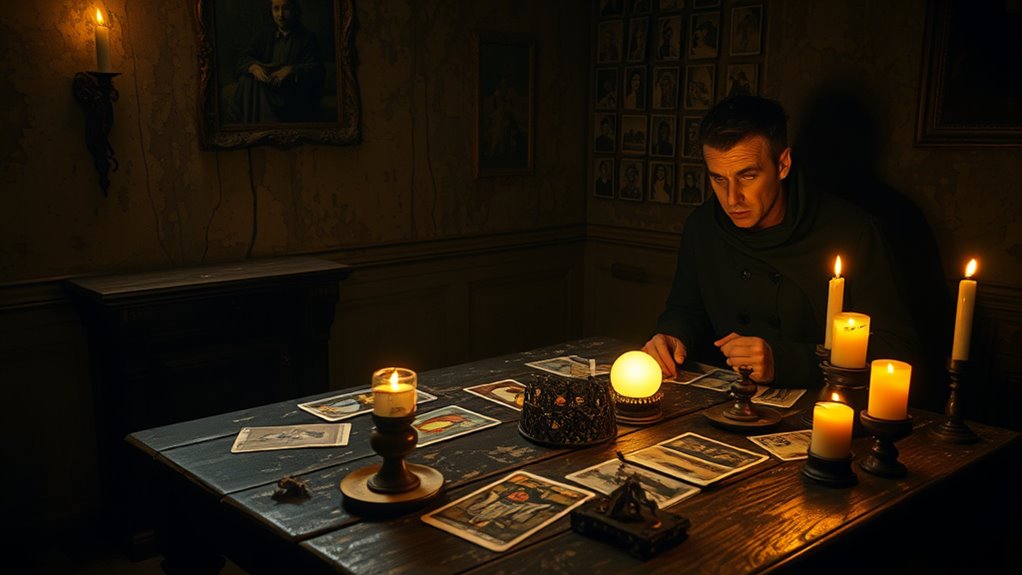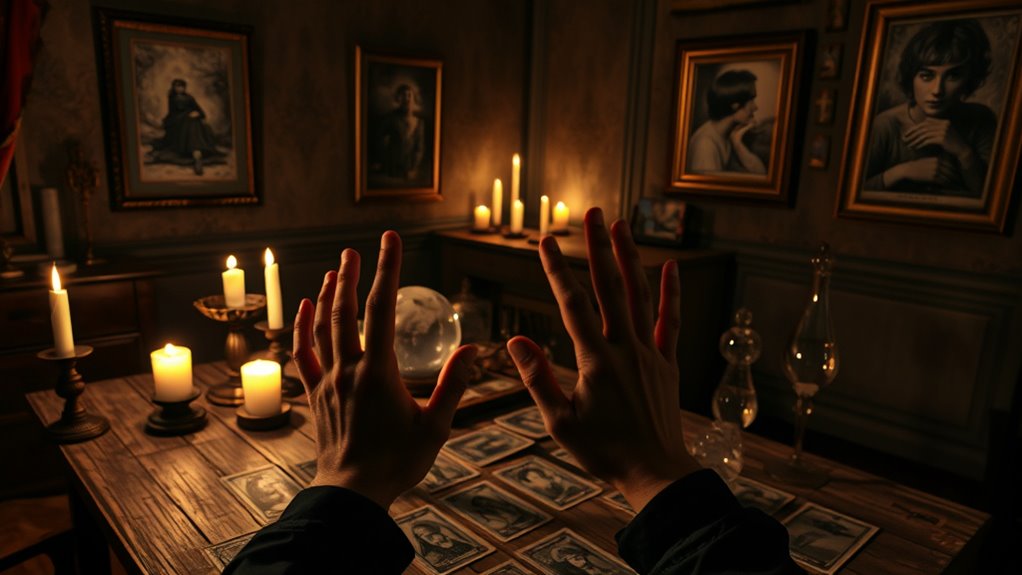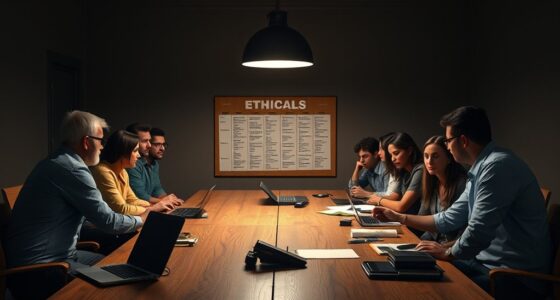Your belief in the paranormal often comes from your mind seeking patterns and meaning beyond what’s normal. Cognitive biases, like confirmation bias, make you focus on evidence supporting these ideas while dismissing facts that contradict them. Your senses can also mislead you, especially when you’re scared or excited. Cultural stories and emotional needs strengthen these beliefs. If you want to understand how your brain constructs these perceptions, there’s much more to explore.
Key Takeaways
- Cognitive biases like confirmation bias reinforce paranormal beliefs by focusing on supporting evidence and dismissing contradictions.
- Perception distortions, especially under emotional states, make ambiguous stimuli seem paranormal.
- Cultural influences and personal experiences shape beliefs, providing comfort and reducing loneliness through supernatural explanations.
- Pattern recognition as a cognitive shortcut helps explain how the brain creates supernatural attributions for unknown phenomena.
- Awareness of these psychological processes reveals how the mind constructs and sustains beliefs in the paranormal despite objective reality.

Many people believe in the paranormal because their minds seek meaning beyond the ordinary, especially when faced with unexplained events. Your brain is wired to find patterns and assign significance, even when none objectively exist. This tendency is rooted in cognitive biases—systematic errors in thinking—that influence how you interpret unusual experiences. For example, confirmation bias can lead you to focus only on evidence that supports paranormal beliefs while dismissing contradicting facts. When you hear a spooky noise at night, you might immediately think of ghosts rather than natural causes like wind or creaking floorboards. This selective perception reinforces your existing beliefs and makes the experience feel more convincing.
Our minds seek patterns and meaning, often reinforcing paranormal beliefs through selective perception and cognitive biases.
Perception distortions also play a significant role in shaping your beliefs. Your senses are not perfect, and your brain often fills in gaps or interprets ambiguous stimuli in ways that support your expectations. For instance, in low-light conditions, your mind might interpret shadows as figures or movement, leading you to believe you’re seeing something paranormal. These perception distortions are amplified by emotional states—fear, anxiety, or excitement—making you more susceptible to believing in supernatural phenomena. When you’re scared or enthusiastic for an explanation, your mind is more likely to distort reality to fit a narrative that offers comfort or intrigue.
Furthermore, the human tendency to seek control and certainty in an unpredictable world is a powerful influence. When faced with death, loss, or unresolved mysteries, you might turn to paranormal explanations because they provide a sense of connection or understanding. Believing in spirits or supernatural forces can make you feel less alone or more in control, even if those beliefs are rooted in cognitive biases. Additionally, cultural influences and personal experiences shape your perception of what’s possible, often reinforcing paranormal beliefs. If you grow up hearing stories of ghosts or have had a strange experience yourself, your brain is more inclined to interpret future ambiguous events through that lens.
Ultimately, these psychological mechanisms serve as shortcuts your brain uses to make sense of the unknown. While they can lead you to believe in the paranormal, they also highlight how your mind’s desire for meaning, combined with cognitive biases and perception distortions, can distort reality. Recognizing these tendencies doesn’t mean dismissing your experiences but understanding that your perception isn’t always an accurate reflection of objective truth. The brain’s pattern recognition capabilities are essential for survival but can sometimes misfire, leading to false beliefs about the supernatural. Instead, it’s a product of your brain’s effort to impose order on chaos, often filling in gaps with supernatural explanations that feel real in the moment.
Frequently Asked Questions
How Do Childhood Experiences Influence Paranormal Beliefs?
Your childhood experiences, like trauma or family storytelling, shape your paranormal beliefs. If you experienced childhood trauma, you might be more prone to believe in the supernatural as a way to make sense of fear or loss. Family stories about ghosts or spirits reinforce these beliefs, making you more likely to accept paranormal ideas as real. These early influences create a foundation that can shape your worldview and beliefs later in life.
Can Paranormal Beliefs Be Linked to Mental Health Conditions?
Did you know around 20% of people with mental health conditions report paranormal beliefs? You might find that these beliefs can sometimes be linked to a psychosis correlation, where distorted perceptions influence what you believe. Additionally, anxiety impacts how you interpret unusual experiences, making paranormal ideas more appealing or plausible. While not everyone with these conditions believes in the paranormal, mental health can shape how you perceive and respond to unexplained phenomena.
What Role Does Cognitive Bias Play in Paranormal Thinking?
Cognitive bias plays a significant role in your paranormal thinking. Confirmation bias causes you to focus on evidence that supports your beliefs while ignoring contradicting facts. The anchoring effect makes you rely heavily on initial impressions or stories, which shape your perceptions. Together, these biases reinforce your paranormal beliefs by skewing your interpretation of experiences and information, making it harder to see alternative explanations clearly.
Are There Cultural Differences in Paranormal Belief Systems?
You’ll find significant cross-cultural perceptions shape paranormal belief systems worldwide. Different cultures influence belief system variations, leading to diverse interpretations of supernatural phenomena. For instance, some societies see spirits as ancestors guiding them, while others view them as malevolent entities. These cultural differences impact how individuals perceive and accept paranormal ideas, making belief systems highly context-dependent. Understanding these variations helps you appreciate how cultural backgrounds influence your perception of the paranormal.
How Does Media Exposure Affect Belief in the Paranormal?
Media exposure acts like a spark igniting your curiosity about the paranormal. When sensationalism floods headlines and TV shows, it blurs fact and fiction, making you more likely to believe in the unbelievable. Social influence amplifies this effect, as friends and online communities reinforce these stories, turning whispers into shared truths. You become part of a collective echo chamber, where media shapes your perception of the paranormal’s reality.
Conclusion
Believing in the paranormal is like chasing shadows in the moonlight—fascinating yet elusive. Your mind seeks patterns and meaning, often filling gaps with what feels real, even if it’s not. By understanding these psychological tendencies, you can see how your beliefs are shaped more by your mind’s desire for connection than by evidence. Remember, sometimes the most convincing illusions are the ones your own mind creates, like a magician pulling tricks out of thin air.









